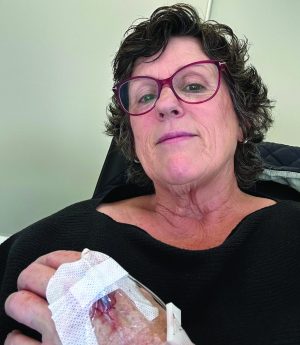Plasma donations needed to supply intravenous immunoglobulin

PLASMA DONATION - Claresholm’s Barb Kemery, receives intravenous immunoglobulin every month to support her immune system, after chemotherapy treatment for non-hodgkin’s lymphoma depleted it. Plasma donations are desperately needed, as currently Canada collects between 13 and 14 per cent of what is needed. The rest is imported. Donations can be made every six days, and the closest donour centre is in Lethbridge. From left are Barb Kemery, receiving her intravenous immunoglobulin, and husband Doug Kemery making a donation in Lethbridge. Photos submitted
By Rob Vogt
Blood, it’s in you to give – but so is plasma. Plasma contains intravenous immunoglobulin with antibodies that block harmful immune responses or calm an overactive immune system. It is used by cancer patients whose immune systems have been depleted by chemotherapy.
Claresholm’s Barb Kemery has non-hodgkin’s lymphoma, a blood cancer. Her cancer affects the B-cells which are responsible for making antibodies. Moreover, Rituximab, the chemotherapy drug given to Kemery, destroys normal B-cells along with cancerous ones. Consequently, Kemery’s immune system is too weak to protect her, so she receives intravenous immunoglobulin because she has low antibody levels. Intravenous immunoglobulin boosts her immune system passively, because her body does not make antibodies, it just uses them. This helps reduce or prevent the frequency or severity of infections.
Intravenous immunoglobulin is covered in Alberta by the provincial health-care system and Canadian Blood Services. Currently, the plasma Canadian Blood Services collects in Canada meets between 13 and 14 per cent of the need for intravenous immunoglobulin. The remaining 86 to 87 per cent is imported.
The closest place to donate plasma is in Lethbridge, and the process is pretty straightforward. After someone books an appointment in advance, when they arrive, they are asked for identification and fill out a questionnaire. Then their blood pressure, iron levels, weight and temperature are taken.
The plasma donation is through a needle inserted into a vein, with sterile equipment used every time. The blood goes into a machine that separates the plasma from red cells, white cells and platelets. The rest of the blood is then returned to the body. Kemery said you may feel a cool sensation during the return process. After the donation is complete, there is a refreshment area with snacks and drinks while the donour is observed by staff for 10 to 15 minutes. There may be some bruising, dizziness, fatigue, chills or nausea, but plasma donation is generally safe.
The actual plasma is a pale, yellow liquid that holds blood cells in suspension, making up 55 per cent of the total blood volume. It is also used by people with clotting disorders; burn victims; emergency trauma; and people with autoimmune diseases.
Typically, it takes 1,000 to 15,000 individual donations to produce one batch of intravenous immunoglobulin. That’s because the plasma from each donour contains a small amount of intravenous immunoglobulin. For a broad spectrum of antibodies, it is pooled from thousands of donours.
Anyone who wishes to donate must be at least 17 years of age, 110 pounds, and in good health. Donating plasma takes about one hour, and a person can donate plasma every six days, so about 52 times a year. A person can donate plasma more frequently than whole blood, which can be done every 56 days, because the body replenishes plasma faster.
Kemery receives intravenous immunoglobulin every month, and in October, she received her 14th one. “I am forever grateful,” she said. Kemery encourages everyone to donate, because no one knows when the next thing will come to hit their families. “I just want more people to donate,” she said. “People really need it.” She also added, with a smile, that refreshments are available. “A cookie is sweet, but donating is sweeter,” Kemery said.
The Canadian Blood Services Plasma Donour Centre is located at 3735 Mayor Magrath Drive South in Lethbridge. Please phone 1-888-236-6283 to book an appointment.
